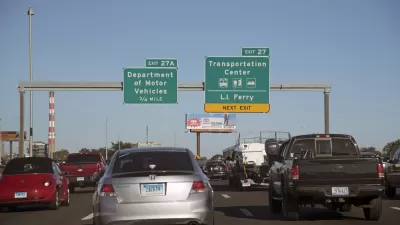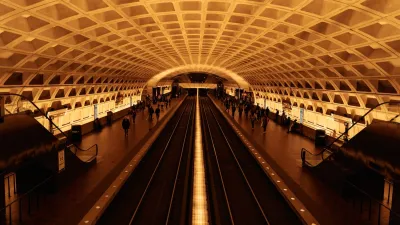Connecticut political leaders are heading toward a vote that would implement tolling on several of the state's highways to help fund transportation infrastructure projects around the state.

A proposal by Connecticut Governor Ned Lamont (D) would fund transportation infrastructure improvements with new electronic tolls on several of the state's busiest highways.
Keith Phaneuf reports:
With less than four weeks left in the legislative session, Gov. Ned Lamont made a bipartisan appeal for compromise on tolls. The Democratic governor pledged to dedicate more resources to transportation construction between now and 2024 — the first year toll receipts might be available.
More specifically:
The governor wants to put electronic tolls on interstates 84, 91 and 95 and on the Merritt Parkway with a base charge of 4.4 cents per mile — before discounts are offered to Connecticut motorists. This would raise $800 million per year for the budget by 2024, the administration says, with 30 to 40 percent coming from out-of-state motorists. Discounts would be provided to Connecticut residents and to frequent travelers.
Phaneuf provides more details of the political process that yielded the most recent deal, as does a separate article by Phaneuf published last week for a different publication. A previous article by Rachel Yonkunas and Kaitlyn Naples focuses on the governor's plan to improve the state's transportation infrastructure.
A hat tip to Angie Schmitt for sharing the Phaneuf article and providing perspective on the national significance of the proposal. Planetizen correspondent Irvin Dawid shared news of the Connecticut tolling debate back in February 2019.
FULL STORY: Lamont Willing To Compromise On Transportation — If Tolls Are Involved

Alabama: Trump Terminates Settlements for Black Communities Harmed By Raw Sewage
Trump deemed the landmark civil rights agreement “illegal DEI and environmental justice policy.”

Planetizen Federal Action Tracker
A weekly monitor of how Trump’s orders and actions are impacting planners and planning in America.

Why Should We Subsidize Public Transportation?
Many public transit agencies face financial stress due to rising costs, declining fare revenue, and declining subsidies. Transit advocates must provide a strong business case for increasing public transit funding.

Understanding Road Diets
An explainer from Momentum highlights the advantages of reducing vehicle lanes in favor of more bike, transit, and pedestrian infrastructure.

New California Law Regulates Warehouse Pollution
A new law tightens building and emissions regulations for large distribution warehouses to mitigate air pollution and traffic in surrounding communities.

Phoenix Announces Opening Date for Light Rail Extension
The South Central extension will connect South Phoenix to downtown and other major hubs starting on June 7.
Urban Design for Planners 1: Software Tools
This six-course series explores essential urban design concepts using open source software and equips planners with the tools they need to participate fully in the urban design process.
Planning for Universal Design
Learn the tools for implementing Universal Design in planning regulations.
Caltrans
Smith Gee Studio
Institute for Housing and Urban Development Studies (IHS)
City of Grandview
Harvard GSD Executive Education
Toledo-Lucas County Plan Commissions
Salt Lake City
NYU Wagner Graduate School of Public Service




























